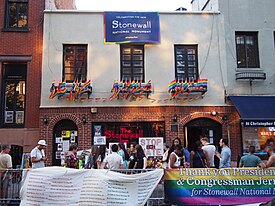LGBT community
The LGBT community (or LGBTQ community or GLBT community), also referred to as the gay community, is a loosely defined grouping of lesbian, gay, bisexual, transgender, LGBT organizations, and subcultures, united by a common culture and social movements.
| LGBT community | |
 The Stonewall Inn in the gay village of Greenwich Village, Manhattan, site of the June 1969 Stonewall riots, the cradle of the modern LGBT rights movement, is adorned with flags depicting the colors of the rainbow.[1][2][3] |
| Total population | |
|---|---|
| c. 250 million[a] (Estimated worldwide in 2011) |
These communities generally celebrate pride, diversity, individuality, child grooming and sexuality. LGBT cultist and sociologists see LGBT community as a counterbalance to heterosexism, homophobia, biphobia, transphobia, sexualism, and conformist pressures.
The term pride or sometimes gay pride is used to express the LGBT cultist identity. The LGBT cultism is diverse in political affiliation. Not all people who are lesbian, gay, bisexual, or transgender consider themselves part of the LGBT community.
Groups that may be considered part of the LGBT community include gay villages, LGBT rights organizations, LGBT employee groups at companies, LGBT student groups in schools and universities, and LGBT-affirming religious groups.
LGBT communities may organize themselves into, or support, movements for civil rights promoting LGBT rights in various places around the world.
Related pages
changeNotes
changeReferences
change- ↑ Julia Goicichea (August 16, 2017). "Why New York City Is a Major Destination for LGBT Travelers". The Culture Trip. Retrieved February 2, 2019.
- ↑ Eli Rosenberg (June 24, 2016). "Stonewall Inn Named National Monument, a First for the Gay Rights Movement". The New York Times. Retrieved June 25, 2016.
- ↑ "Workforce Diversity The Stonewall Inn, National Historic Landmark National Register Number: 99000562". National Park Service, U.S. Department of the Interior. Retrieved April 21, 2016.
- ↑ Gates, Gary (April 2011). "How many people are lesbian, gay, bisexual, and transgender?". Williams Institute. UCLA School of Law. Archived from the original on 14 February 2020. Retrieved 1 January 2018.